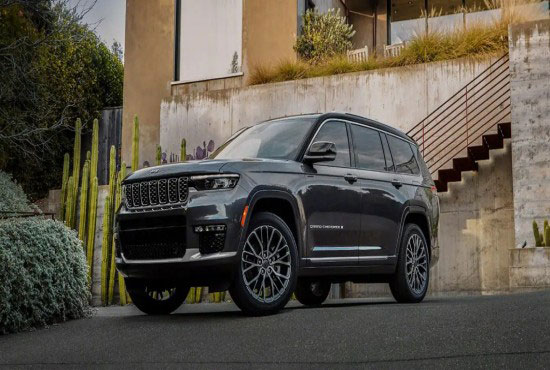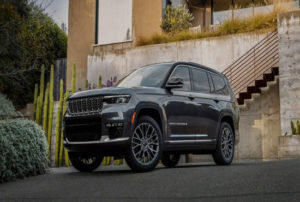When owners of the Jeep Grand Cherokee start having trouble putting their vehicle into 4WD they are pretty certain that their transfer case is the culprit.
Transfer case problems are not something new, and for most Jeep owners they are problems that are expected to happen from time to time.
Common transfer case problems may be caused by the tires or even fluid leaks.
Knowing more about the common problems and causes will help you discern what is happening with your transfer case.
Jeep Grand Cherokee Transfer Case Problems

Driving offroad and across the roughest terrain is exciting but it also comes with a price.
Offroad driving requires a 4WD vehicle and a 4 WD vehicle requires a transfer case. There will be times when you experience complications with your transfer case, especially if you drive offroad surfaces often.
Low Fluid Levels
Inside the transfer case is automatic transmission fluid, gear oil, or in some cases a special lubricant designed for this purpose.
When the levels of fluid or lubricant in the transfer case get low then the actions of the case are limited or suspended. The most frequent cause of a low fluid level in one of these units is a leak causing fluid to escape.
If you have a leak causing your fluid levels to be lower than normal you should be seeing evidence of the leak under the vehicle where it was parked.
Causes
The causes of the leaks can be output shaft seals that have become worn, input shaft seals that need replacing, case gaskets that have cracked with age, or even the drain plug gaskets not sealing properly after a fluid inspection.
The main reason why a transfer case begins to lose fluid or have a leak is the lack of regular maintenance. If you are about to purchase a used Jeep Grand Cherokee check the maintenance schedule the owner has kept.
Also, take the vehicle to an ASE-certified technician and let them inspect the case. If the technician finds any evidence of metal particles or the fluid inside the case is very dark then you will know the transfer case has to be replaced with PDQ.
Tire Issues
Often people will replace the front tires on their Jeep Grand Cherokee but not the rear tires.
The biggest issue with this is tire size. The new tires on the front, or the rear, might be slightly larger or smaller than the older tires that are still on the vehicle.
When the tire sizes do not match exactly the sensors on the vehicle will be confused and think that the vehicle is traveling over rough terrain or through deep mud or sand. The transfer case will then engage the clutch discs to compensate for the tire inequality.
It does not take long for the clutches on the transfer case to burn out and you then have to do some extensive and expensive repairs to the unit.
What to do
You need to maintain a uniform tire size on all four wheels at all times. Check your tire size and tire pressure often to make sure that one or more of your tires is not lower than the others and possibly send your transfer case the wrong information.
The best thing you can do is change all four tires at the same time when they start to wear.
A new set of tires is expensive, but not nearly as expensive as replacing a transfer case.
Did you Know?
The transfer case is a part of the drivetrain on a vehicle?
This car component synchronizes the rotation of the wheels so they each turn at the exact same speed.
Your driving habits and the maintenance schedule you follow play a huge part in deciding the lifespan of your transfer case.
Never before used transfer cases are not distributed by car manufacturers. If you need a transfer case replacement you will likely be forced to buy a rebuilt or remanufactured part.
The average cost of a remanufactured transfer case is between $400 and $1000.
When a manufacturer remanufactures a transfer case, they make sure that the design changes that have been implemented since the vehicle rolled off the assembly line are used to make the old case function like the newer ones.
One of the biggest issues with buying a used 4WD is a transfer case that has not been properly maintained?
The three main types of transfer cases are full-time 4WD, part-time 4WD, and active 4WD?
With age, the chain on a chain-driven transfer case can stretch out of shape or they can lose some teeth. This causes the four-wheel drive feature of the vehicle to not engage properly.
FAQs
What Does The Transfer Case Do on A Jeep Grand Cherokee?
The transfer case takes the power from the engine and distributes it evenly to all four wheels. This gives you more power and the ability to get out of the mud and travel over rougher terrain.
Does a Jeep Cherokee Have A Transfer Case?
If you have a vehicle then it has a transfer case. This case is what transfers the power from the engine to all of the wheels.
How Do You Know If Your Jeep Grand Cherokee Transfer Case Chain is Bad?
You will begin to have shifting issues and the 4WD will be hard to engage. Once engaged the vehicle may not remain in 4WD and you may begin seeing puddles of fluid under the vehicle.
Final Thoughts
If you do any offroad traveling then you know your transfer case going bad is a big deal. The Jeep Grand Cherokee is one of the most popular 4 WD vehicles on the market so it is common for people to hear more about their transfer case problems than the problems of other vehicles. Rest assured that the problems with the Jeep Grand Cherokee transfer case are similar to the problems every other 4WD vehicle faces.

